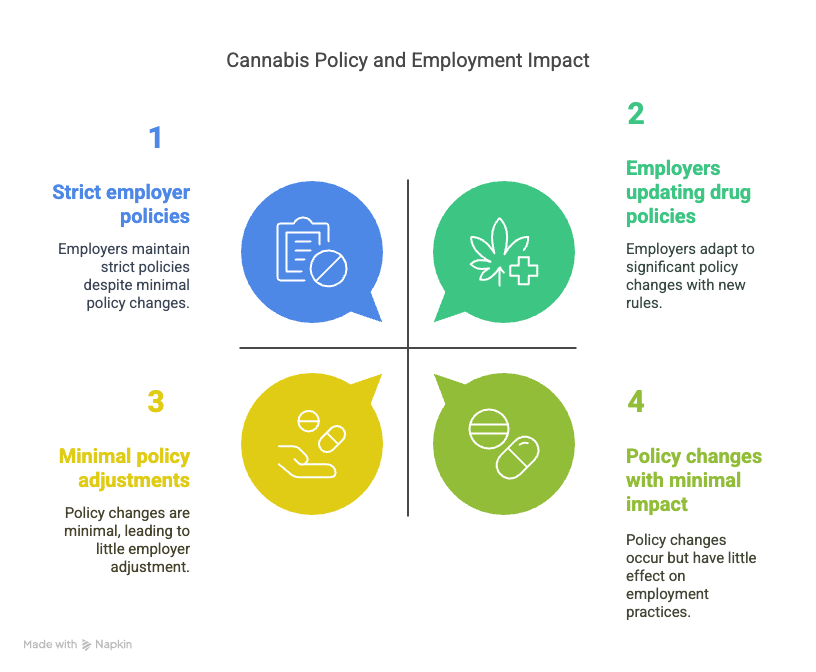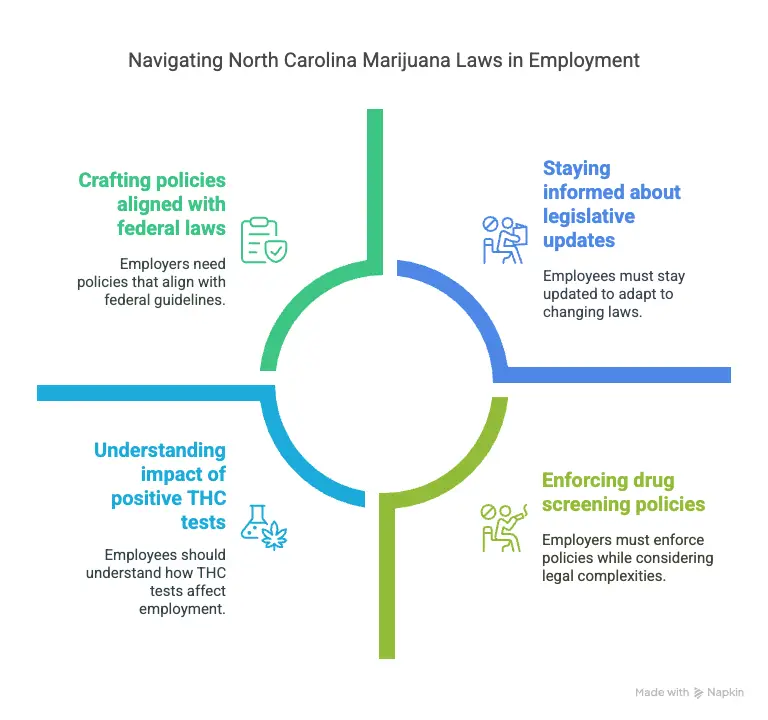The winds of change are sweeping across North Carolina with evolving cannabis laws, and both employers and employees are keen on understanding what this means for workplace drug testing. Although cannabis decriminalization is making headlines, the implications for employment screenings might not be as clear-cut.
In this guide, we'll navigate through the intricacies of North Carolina's current cannabis legislation, its impact on employment screenings, and how companies can adapt their drug testing policies to align with the new legal landscape. Whether you're an employer trying to frame fair policies or an employee wanting to know your rights, this comprehensive overview has you covered.
Key Takeaways
- Cannabis decriminalization in North Carolina decreases penalties but doesn't make it fully legal, impacting how employers approach drug testing.
- Many employers still test for THC despite decriminalization, posing challenges in ensuring policies align with legal changes.
- Clear communication between employers and employees about drug policies helps avoid misunderstandings and maintain workplace safety.
- Employers are encouraged to update drug policies by consulting legal experts and possibly focusing on impairment rather than THC presence.
- Staying informed about legislative changes is crucial for both employers and employees to navigate the evolving cannabis laws effectively.
Introduction
Cannabis decriminalization is gaining momentum across the United States, and North Carolina is no exception. With these changes, understanding their impact on employment drug testing is crucial for both employers and employees. How companies navigate these laws can affect workplace policies and employee well-being.
This guide focuses on how decriminalization is reshaping drug screening policies within the state. Employers are reevaluating their approaches, while employees must be aware of their rights and responsibilities. Our aim is to shed light on these complexities and offer insights into aligning business practices with evolving legislation.
Understanding Cannabis Decriminalization in North Carolina
North Carolina's approach to cannabis is evolving, but it's essential to know where things stand. The state has taken steps toward decriminalizing cannabis, making possession of small amounts similar to a minor traffic violation. Don't mistake this for legalization. Decriminalization reduces penalties but doesn't make cannabis use fully legal.

Recent changes in legislation are pushing this shift. For example, possession of up to half an ounce of cannabis is now a civil matter, not a criminal one. You might get a fine, but it won't result in jail time. This is a significant change, impacting how employers view drug policies.
Understanding the difference between decriminalization and legalization is crucial. Decriminalization eases penalties related to cannabis possession but keeps the substance illegal. Legalization would allow cannabis to be used freely, sometimes even commercialized like alcohol. For employers, this means that while individuals wonât face harsh criminal penalties for minor possession, they could still face consequences under company policies.
For employment screening, this means current rules are in flux. Employers must decide how to approach drug testing amid these changes. Should policies be updated to reflect decriminalization? Or should they remain strict? Understanding the legal environment is the first step in making informed decisions.
Impacts of Cannabis Decriminalization on Employment Screening
As North Carolina moves toward cannabis decriminalization, employers face a crossroads. Some companies are updating their drug policies to reflect the changes, while others stick to traditional no-drug policies. This contrast reflects differing operational needs, industry regulations, and workplace cultures.
THC testing remains a critical point of discussion. Despite decriminalization, many employers in North Carolina still test for THC. This can be pivotal for positions involving safety-sensitive duties. The challenge arises in aligning these tests with the legal reality where possession and use might not lead to legal penalties.
For you, as an employer, adapting to this evolving landscape requires careful navigation. Review your existing drug policies and consider the implications of continued THC testing. Align your approach with both state laws and public opinion. This doesn't just safeguard your company legally but also aligns with workforce expectations.
Practical steps include consulting legal experts to align policies with current laws. Stay updated on legislative developments. Engage with employees to understand how these policies impact them, fostering a transparent environment.
The balance between maintaining safety standards and respecting employee rights has never been more critical. How does your current policy reflect this balance? Are there adjustments to be made for fair treatment while ensuring workplace safety? These are essential questions as you align with North Carolina's shifting legal framework.
Navigating North Carolina Marijuana Laws in Employment Screening
Understanding marijuana laws in North Carolina is crucial if you're involved in the hiring process. The state has made strides in decriminalizing cannabis, but legalization is still off the table. This difference matters when it comes to employment screening.

For employers, knowing the legal ramifications is essential. Decriminalization reduces penalties for possession but doesnât permit recreational use. As a result, companies face a complex environment when enforcing drug screening policies. You need to navigate these laws carefully to remain compliant while safeguarding workplace safety.
Employees should also be mindful of the current legal framework. Testing positive for THC can still impact employment opportunities. Employers have the right to maintain drug-free workplaces, and a failed test could affect both hiring prospects and job retention.
The Federal Trade Commission (FTC) provides guidance that can aid you in this process. Reviewing their guidelines can help craft policies that align with federal laws while considering state-specific regulations. This includes respecting privacy, obtaining consent, and allowing employees to correct any inaccuracies in reporting.
Both employers and employees must adapt to these changes, staying informed about ongoing legislative updates. This understanding ensures youâre prepared for the legal landscape as it shifts and that your policies reflect current laws without overstepping boundaries.
Developing Fair and Compliant Drug Policies
Creating fair and compliant drug policies can seem tricky with the current cannabis decriminalization movement in North Carolina. But with the right strategies, you can manage this change effectively.
Start by reviewing your existing policy. Is it aligned with current state laws? If you haven't revised it recently, there's a good chance it isn't. Ensure that it accurately reflects the legal status of cannabis and clearly states how cannabis use will be handled. This clarity will help avoid misunderstandings.
Consider focusing on impairment rather than the mere presence of THC. Some companies now test for impairment to ensure workplace safety without infringing on personal rights. This shift can be significant in striking a balance between maintaining a safe work environment and respecting employee privacy outside work hours.
Training for managers is crucial. Equip your staff with the necessary tools to recognize signs of impairment and handle sensitive situations appropriately. Clear guidelines can prevent confusion and promote fairness.
You may also want to reassess whether positions require mandatory drug tests. For instance, safety-sensitive roles might justify stricter testing. However, re-evaluating the necessity of pre-employment drug tests for non-safety-sensitive roles could be worthwhile.
Draft a policy template that includes the scope of testing, substances tested, procedures, consequences of non-compliance, and an appeal process. The language should be straightforward, avoiding unnecessary legalese to ensure it is easily understood by all employees.
Testing cadence matters too. Decide if random testing is justified, or if reasonable suspicion and post-incident tests are more fitting. Establish a process for challenging test results to protect against mistakes and maintain trust.
Balance is key: protect your company's interests without eroding trust among your workforce. Effective communication about policy changes, processes, and exceptions fosters a transparent, respectful relationship. Does your policy foster trust while ensuring safety? Implement these practices to navigate the evolving landscape successfully.
Future Trends and Considerations
Keeping an eye on legal developments is crucial. Change is constant in cannabis legislation, and both employers and employees need to stay updated. Regularly review state and federal laws to make sure your policies align with current practices. Subscribe to legal updates or join local business associations for the latest information.
In terms of drug testing, expect shifts. As more states decriminalize cannabis, the focus may move from testing for THC to other substances that might affect workplace safety. Employers might also adopt impairment testing methods rather than substance presenceâshifting the evaluation from whatâs in the system to actual impairment on the job.
These legislative changes might influence workplace culture. Flexibility and open dialogue about personal choices and safety can foster more trust and better work environments. Employers who adapt openly can lead their organizations to a more inclusive culture while maintaining safety and compliance.
Consider how these changes could influence workplace training and education. Offering clear guidelines and tailored programs can help employees understand new policies, their responsibilities, and their rights. This proactive approach can mitigate misunderstandings, enhance workplace harmony, and improve overall morale.
What steps are you taking now to anticipate these changes? How can you ensure that your policies not only comply with legal standards but also promote a positive and fair workplace? Prioritize these questions to stay ahead in this evolving landscape.
Conclusion
Understand that while cannabis may be decriminalized, it isn't fully legal, and THC testing remains a reality in many workplaces. As an employer, clarity in your drug policy can prevent misunderstandings. Encourage open discussions with employees about expectations regarding cannabis use.
On the other side, employees must know not only their rights but also the reasoning behind employer policies. If you're using cannabis medicinally, itâs crucial to communicate this with your employer, as it might affect your role's requirements.
Adapting to these changes isn't just about compliance; it's about fostering a workplace culture that values safety and respects personal rights. By taking an informed, balanced approach, both employers and employees can navigate this changing landscape with confidence and mutual respect.
Frequently Asked Questions (FAQs)
Can NC employers test for cannabis?
Yes, employers in North Carolina can test for cannabis as part of their drug testing policies.
Are medical marijuana users protected in NC hiring?
No, North Carolina does not offer specific employment protections for medical marijuana users.
Can you be fired for off-duty cannabis use in NC?
Yes, you can be fired for off-duty cannabis use if it violates company policy.
Do NC employers have to ignore marijuana misdemeanors?
No, employers in North Carolina are not required to ignore marijuana-related misdemeanors during hiring.
How to handle positive THC tests in NC?
Address positive THC tests by checking your companyâs policy and discussing the circumstances with the employee involved.
Are safety-sensitive jobs exempt from NC cannabis laws?
Yes, safety-sensitive positions often have strict drug testing requirements to ensure workplace safety.
Can dispensary workers fail background checks in NC?
Dispensary workers in North Carolina might fail background checks if they have relevant criminal convictions.
Does NC expunge old cannabis convictions?
Yes, there are opportunities to expunge certain cannabis convictions in North Carolina under specific conditions.
Are out-of-state medical cards recognized in NC?
No, North Carolina does not recognize out-of-state medical marijuana cards.
How to update workplace drug policies in NC?
Review current laws and business needs, then update your policy to clearly communicate expectations and consequences.
Can employees in NC request accommodations for medical marijuana use?
No, North Carolina does not mandate employers to accommodate medical marijuana use.
Is random drug testing allowed in NC workplaces?
Yes, employers can conduct random drug testing as long as it complies with state and federal guidelines.
How do federal contracts affect cannabis testing in NC?
Federal contractors must comply with federal drug-free workplace requirements, which include cannabis testing.
What should you do if falsely accused of cannabis use at work in NC?
If falsely accused, gather evidence, request a retest if applicable, and discuss the issue with HR to resolve the situation.
Definitions
Drug Testing
Drug testing is the process employers use to check for the presence of illegal or controlled substancesâlike THCâin an employeeâs system. Itâs often part of pre-employment screening, random checks, or post-incident evaluations. Employers use it to maintain a safe workplace, especially in safety-sensitive roles. You might face testing if you're operating equipment, driving, or working in healthcare.
Decriminalization
Decriminalization means certain actionsâlike possessing small amounts of cannabisâno longer carry criminal penalties. In North Carolina, minor possession may result in a fine instead of arrest or jail. This change reduces legal consequences but doesnât make possession legal. If you test positive at work, you might still face employment consequences, depending on company policies.
Workplace Policy
A workplace policy outlines rules and expectations that employers set for employees. Drug and alcohol policies are a key part of this. Your company's policy will clarify whether cannabis use is allowed, how testing works, and what happens if someone fails a drug test. Clear policies help reduce confusion and make enforcement fairer.
Safety-Sensitive Position
A safety-sensitive position involves tasks where being alert and unimpaired is critical. These jobs often include driving, operating machinery, or caring for others. If you're in one of these roles, your employer is more likely to require strict drug testing. Even with cannabis decriminalized, testing positive could impact your employment.
Medical Marijuana Disclosure
Medical marijuana disclosure is when an employee tells their employer they use cannabis for health reasons. If you use a doctor-approved product and your job requires drug testing, itâs best to inform HR with the proper documents. This helps clarify where your use stands within company policy and might prevent misunderstandings.

GCheck Editorial Team
Meet the GCheck Editorial Team, your trusted source for insightful and up-to-date information in the world of employment background checks. Committed to delivering the latest trends, best practices, and industry insights, our team is dedicated to keeping you informed.
With a passion for ensuring accuracy, compliance, and efficiency in background screening, we are your go-to experts in the field. Stay tuned for our comprehensive articles, guides, and analysis, designed to empower businesses and individuals with the knowledge they need to make informed decisions.
At GCheck, we're here to guide you through the complexities of background checks, every step of the way.






